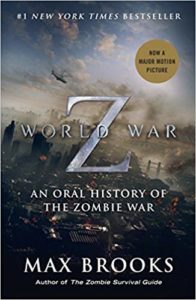An oral history of the Zombie War!?
No, UC Berkeley’s Oral History Center isn’t about to undertake an oral history project on humanity’s battles with zombies. But this was the subtitle to the 2006 novel by Max Brooks, World War Z, that was later made into a big-budget movie starring Brad Pitt as, what else, a former UN employee-turned-zombie eradicator. Having experienced both versions, I can say without qualification that the book was far superior to the movie, in part because the book attempted to take the oral history dimension a bit more seriously—while not skimping on fun or sensation. “Oral history” in this case was the novel’s conceit: first person accounts collected in the wake of the war (spoiler alert: the zombies lose), edited and spliced together in an attempt to create a narrative of the madness. But, really, is this “oral history”?

In recent years, “oral history” has moved from academic jargon to pop culture ubiquity. While there have been moments in the past when oral history-like projects have broken through (think Alex Haley’s Roots), only now are we seeing, for example, “An Oral History of the Time Wayne Gretzky Appeared on SNL,” an article which appeared last month in Forbes (of all places!). Surely my colleagues and I are thrilled that oral history appears to be having a moment. Less often do I get that crinkled look on someone’s face when I tell them, “I’m an oral historian.” They’re not as likely to ask, “Does that have something to do with… dentistry?” But. We are not entirely comfortable with what this increase of recognition means. People link “oral history” to any number of cultural products, maybe especially StoryCorps, which is regularly featured on NPR. Like World War Z, however, even StoryCorps is quite different from the way in which professional, university-based oral historians do our work.
Within the oral history community there is on-going conversation about just what elements comprise “best practices.” Yet, there is some baseline agreement as evidenced by the Best Practices document approved by the members of the Oral History Association in 2018. At the Oral History Center, our definition of “oral history” begins with a set of core practices and procedures. These practices set our work apart from anthropologists, most journalists, and, yes, fictional chroniclers of the zombie wars.
Oral history at Berkeley begins with creating a project and determining its size and scope, which might result in fifty interviews or just one. We select the narrators, or interviewees, and ask them to sign a letter of informed consent. This letter details their rights and responsibilities, including the fact that they can withdraw from a project at any point prior to its completion. The interviews are conducted, typically in two-hour sessions, and are recorded on video, unless the narrator wants audio-only. All interviews are transcribed then lightly edited by our staff before being given to narrators for review and approval. We finalize the transcripts, deposit them in The Bancroft Library, and usually make them available to world-at-large through our website. So, for us, “oral history” is defined by three key elements: thorough research and planning; narrator consent at the beginning and approval at the conclusion of the project; and broad accessibility to the finished and approved transcript (and, increasingly, to the original recording as well). Once these bona-fide oral histories have been completed and offered up for use, hungry minds around the world are given the opportunity to create their own interpretive oral history projects on any number of subjects from the banal to the profound, from the tiny to the grandiose—but let’s all hope not on any zombie war past, present, or future.
In this issue of our monthly newsletter, we ponder the question of “what is” and “what is not” oral history. As you’ll notice, we are not doctrinaire, but we do take this question very seriously and think that it is a useful starting point for any conversation about what it is that we do.
Martin Meeker, Charles B. Faulhaber Director of the Oral History Center